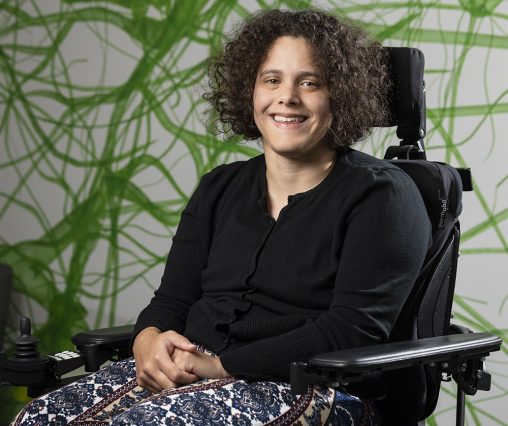
Amelia Whorton, who is pursuing a master’s degree in physiology and neuroscience at Wright State, received a boost of support from the M. Patrick Daniels Scholarship.
Growing up in the Dayton area, Amelia Whorton was long aware of Wright State University’s reputation for providing an accessible campus community for students with disabilities.
“I always knew that to be successful in the future, I would need to obtain higher education at a facility where accessibility is a priority,” said Whorton, a Wright State graduate student who has cerebral palsy.
While Wright State’s accessible campus and the Office of Disability Services offered the environment and support that Whorton needed, a scholarship provided another boost to help her succeed. Whorton is a recipient of the M. Patrick Daniels Scholarship, which honors the late Wright State alumnus Patrick Daniels.
“Though physically challenged by the effects of muscular dystrophy—a genetic disease which progressively diminishes muscular strength and function and for which there is no cure—our son, Patrick, wanted to pursue his dreams of becoming a lawyer,” said Patrick’s father, Michael Daniels. “Wright State University, through its world-class Office of Disability Services, provided resources and support and helped Patrick obtain his undergraduate degree in 2000 and subsequent law degree from the University of Pittsburgh in 2004. This support enabled Patrick to not only fulfill his dream but to live a productive and meaningful life.”
Whorton is grateful for the scholarship provided by the Daniels family and looks forward to following in Patrick’s footsteps by breaking down barriers for people with disabilities.
“The M. Patrick Daniels Scholarship has allowed me to focus on my field of study without worrying about funding. I am honored to receive this award because Patrick Daniels obtained his law degree and created an example of someone with a disability who did more than people expected,” she said. “I am very thankful for the support his family has given the disability community at Wright State over the years.”
Whorton, who is pursuing a master’s degree in physiology and neuroscience, plans to become a college professor and an advocate for making the STEM fields more accessible.
“Individuals in the disability community are born problem solvers, and STEM is all about solving problems; however, disabled STEM scholars struggle to open doors,” said Whorton. “The Americans with Disabilities Act is the bare minimum, and until we start to recognize individuals with disabilities for their talents and contributions, equity does not exist.”

 Wright State student-athletes make a lasting impact on local family, more to come
Wright State student-athletes make a lasting impact on local family, more to come  Wright State names Rajneesh Suri dean of Raj Soin College of Business
Wright State names Rajneesh Suri dean of Raj Soin College of Business  ‘Only in New York,’ born at Wright State
‘Only in New York,’ born at Wright State  Wright State president, Horizon League leaders welcome new commissioner
Wright State president, Horizon League leaders welcome new commissioner  Wright State celebrates homecoming with week-long block party
Wright State celebrates homecoming with week-long block party 